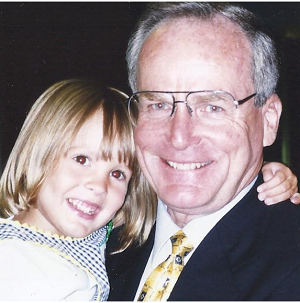
Ralph's History
Gone But Not Forgotten
 Brigadier General Ralph H. Graham, United States Air Force Academy Class of 1964, died of a heart attack in Tucson, AZ on 13 October 2002. He was buried at the Air Force Academy Cemetery.
Brigadier General Ralph H. Graham, United States Air Force Academy Class of 1964, died of a heart attack in Tucson, AZ on 13 October 2002. He was buried at the Air Force Academy Cemetery.
Philippians 4:8 says, “Finally brothers, whatever is noble, whatever is right, whatever is pure, whatever is lovely whatever is admirable — if anything is excellent or praiseworthy — think about such things.”
And think of Ralph Graham. Ralph was a devoted husband, a loving father, a doting grandfather, a successful executive, an Air Force General, a 24/7 patriot, and an American hero, with a service reputation second to none. His secret weapon was his faith. Ralph had a deep and abiding faith in our Lord Jesus Christ, and it gave him the peace and confidence we all saw in him. From the earliest days, Ralph was a leader. In school, and later, when we went through basic training at Lackland AFB, TX and even during that “Doolie Christmas” we spent at USAFA, Ralph was leading the way! Ralph grew up on the Western slopes of Colorado and the mountains were his home, so he thought we should all go for a “climb” during that holiday break.
Not surprisingly, one of our classmates got in a bad predicament, but there was Ralph with rope to the rescue. Yet, however strong his care was for people. his feeling for academics was something else. While at USAFA and within the squadron, Ralph was known as “Perry, Ohm, Shakespeare” and I can tell you it was not because of his love of Law, Double E, nor English Literature. Still, his care for people was evident from the beginning. Later as the Cadet Squadron Commander for ‘Friendly First”, this point was driven home clearly as every ring in our squadron for ‘64 was inscribed, “First takes care of its own.” Ralph was a leader because when you met him, there was an extraordinary sense of integrity and dignity; he was a solid, straight-up guy, someone you couldn't help but admire and respect. He was one of those men who could handle a really bad situation in a steady, professional manner and not think it was a really big deal. In short, Ralph Graham was the finest gentleman you could ever hope to meet.
Making his first stripe as an airman third class ranked right up there with pinning on his star. He was that kind of man. He loved people, which means he respected them, and you never heard Ralph say an unkind thing about another person. From those very first days in Basic at Lackland, through USAFA and later when Ralph would stop at Whiteman and McConnell for gas enroute from Nevada to Andrews and back, we talked about our Air Force and our families. For Ralph, that meant Sharon; sweethearts since high school, she made his motor run, she charged his batteries and she steadied him. You could not and you cannot think of one without the other: Ralph and Sharon, they just go together.
Ralph was an air warrior and air leader. While flying RF-4s over Vietnam he took more than a few hits. On more than one mission it was only through his extraordinary airmanship that he was able to bring the jet back for a tough, battle-damaged recovery. His combat airmanship was awarded the Silver Star, three Distinguished Flying Crosses and multiple Air Medals. Later, in the early ‘80s in the skies of Nevada and California, his airmanship paved the way as our Air Force began to adapt a wonderful, yet complex flying machine, the F-117, which would make powerful differences in the employment of air power in other skies and over other countries. Ralph went on to take his combat, test and acquisition leadership and apply it as the Program Director for the F-16. In retirement, Ralph was an executive with Texas Instruments and then Raytheon working in the area of defense suppression at which he was indeed a master.
Ralph is survived by his wife, Sharon; daughters Kristen and Kathie, three grandchildren, and his brother Lynn; yet while he is gone, he will never be forgotten by a single one of us.
(Jay W Kelley '64, Gone But Not Forgotten, Checkpoints, Winter 2003)
[ Home ] [ Table Of Contents ]